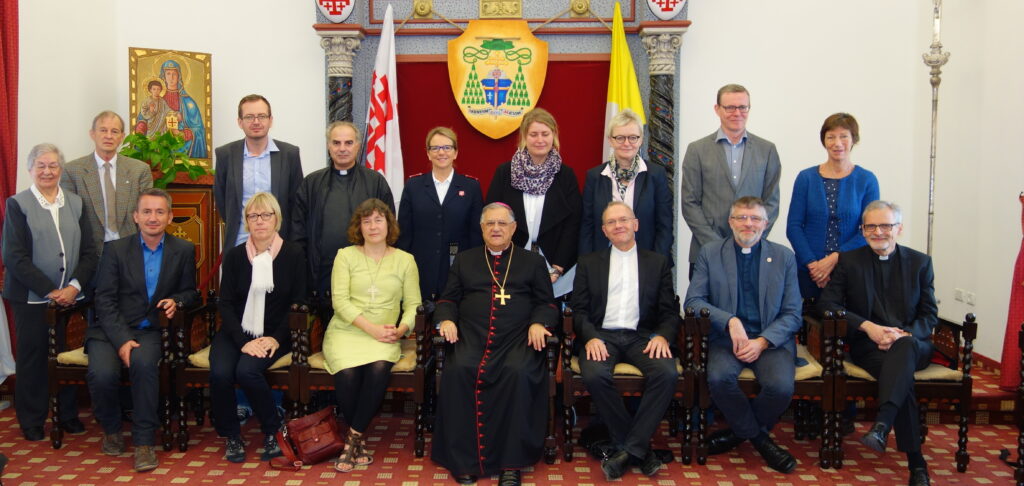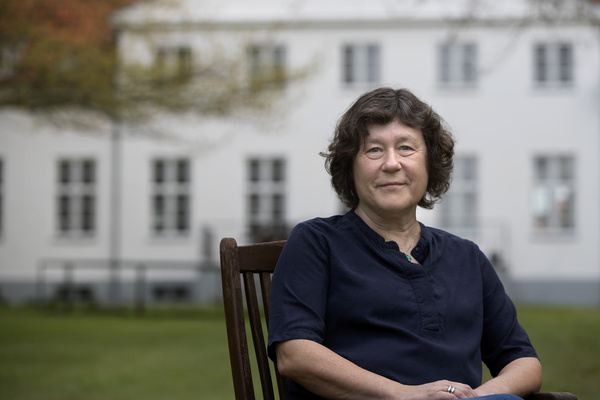Palestinian Christians: Feeling Doubly Let Down by Western Churches

By: Marianne Christiansen / Arab America Contributing Writer
The article was originally published in the Danish Christian daily Kristeligt Dagblad on February 18, 2025. It has been translated from Danish by Uffe Gjerding for Arab America.

We must break the silence – and speak for those who need to hear that they are seen as equal human beings, writes today’s columnist, Bishop Marianne Christiansen, after meeting Palestinians during a recent week-long visit to Palestine and Israel.
Fear creeps into my body. I am ashamed to admit it because I have my EU passport and a plane ticket home. I live in a free country and should be allowed to express myself. Yet, I am overcome with fear merely from hearing the intense testimonies of the people sitting in front of me in the West Bank—people whose family and friends are suffering or have been killed in Gaza, whose acquaintances are held indefinitely in Israeli prisons, and who have themselves been imprisoned and bear the marks of torture and mistreatment.
On a daily basis, they live in fear of the arbitrary use of force at the approximately 850 checkpoints that divide the Palestinian territories from each other and Israel. These checkpoints are often closed without warning or explanation for hours or even days, preventing children from returning home from school and blocking those in labor or in need of urgent medical care from receiving help.
I am overcome with fear when I have to pass through the checkpoints myself, handing over my ID—along with others on the bus or in the street—to heavily armed young soldiers without knowing if or when I will get it back. Here, there is no right to appeal.
I spent only a week in East Jerusalem and Bethlehem, but that was enough to get a glimpse of what it means to live under occupation and massive surveillance. In Denmark, there has been much discussion in recent months about the German occupation during World War II and the bravery of the resistance. The Palestinian people have lived under occupation for so long that mere existence itself is seen as an act of resistance. Silently and expressionlessly, you hand over your ID and wait.
In the West Bank, many families have relatives in Gaza who are enduring destruction and what is now being investigated as genocide. The world watches without lifting a finger. “It’s as if we are considered non-existent—and that is how they make us non-existent,” says one of my interlocutors.
Bethlehem feels like an open-air prison. On the wall’s watchtowers that encircle the city like a prison camp, AI-powered cameras have recently been installed, capable of long-range facial recognition to closely monitor the movements of the population. My interlocutors note with bitterness that Israel is a major exporter of surveillance technology to the West—technology developed and tested on the Palestinian population.
Regarding the prisoners currently being released, my interlocutors say: “There are about 17,000 left. People are being detained administratively or convicted of being a threat. When they release 100, they detain 1,000 more. They attack those who have been detained and destroy their homes and their families’ houses. It’s collective punishment. Look at what’s happening in Jenin.”
(I cannot verify the figures, but I refer to Amnesty’s report here and the report from B’Tselem, “Welcome to Hell – The Israeli Prison System as a Network of Torture Camps,” here.)
The desperation is profound. For the people I speak to, the oppression didn’t begin on October 7th; it has been intensifying for decades. The settlers and the government have seized one piece of land after another, leaving only a vanishingly small portion of what, according to the UN resolution, should be Palestinian land. The people I speak to have deep roots in the country, spanning many generations, and they say in disbelief: “It’s as if the rulers of the world don’t understand what homeland means—other than a piece of land that can be traded for another. We belong here, but large posters placed by settlers along the roads read in Arabic: ‘You have no future here.’”
Everything the Palestinian people in the West Bank experience from the occupying forces seems designed to pressure the population to leave the country. Most recently, President Donald Trump famously tried to persuade Jordan, Egypt, and other countries to accept the relocation of displaced Palestinians. For those I speak to, it’s almost a relief that the world can now openly recognize that this is about ethnic cleansing and apartheid.
My interlocutors are Christian Palestinians. Their conditions are no different from those of their Muslim compatriots, and they do not wish to be seen as separate from their fellow Palestinians of other faiths. They represent the Christian presence in the Holy Land, which has existed since the time of Jesus under various rulers. Now, they feel abandoned and forgotten by the churches of the West.
“The churches of the West, by their silence, are complicit in the fact that there will soon be no more Christians in the Holy Land.” In the past year alone, more than 100 Christian families have left Bethlehem, where unemployment is estimated at 70 percent. Many fear that the bombing of Gaza will be followed by military attacks on Palestinian towns and communities in the West Bank, which are now completely isolated from each other by the countless checkpoints. The Christians are disappearing from the Holy Land, not because of their Muslim compatriots, but because of the occupation, oppression, and dire economic situation.
Those with children and young people and the resources to do so are searching the world for a place where they can live in dignity and without constant fear. Christian Palestinians feel doubly let down by Western churches, as most Palestinians hear foreign evangelical Christians openly supporting the Israeli right wing, the settlers, and the war against the people of Gaza. At the same time, they hear no protests from the ‘old’ churches. As a result, they are left to believe that this is what Christianity represents.
The criticism of silence that I encounter from the Palestinian side hits hard. Why is it that we do not dare to criticize what is clearly abuse and oppression? Is it for religious reasons? Out of a guilty conscience? Or for the sake of the United States? On religious grounds, so-called Christian Zionists, who have a strong influence in American politics, support the Palestinians leaving the country—including the West Bank, which they call by its biblical names, Judea and Samaria. This belief is rooted in the conviction that it is God’s will and that blessing will come to those who support Israel. They believe that only when Jewish people inhabit the entire land will Jesus return. Is that what we believe? Is that the reason we remain silent?
In the sermons I heard in the Holy Land, I was told that God is with the oppressed and will heal and uplift the suffering. This is also what I have learned at home from the gospel of Jesus. But can a religious belief in God’s goodness justify inhumane behavior and ethnic cleansing? Here, we must answer: yes or no.
The guilty conscience over the centuries-long persecution and oppression of the Jewish people in European societies and by the churches, culminating in the Nazi attempt at the Final Solution and the Holocaust, can easily justify support for Israel as a safe haven for the Jewish people. But it cannot justify making the Palestinian people pay for the West’s bad conscience. That is unquestionable. Perhaps that’s why we remain silent—we don’t want to acknowledge that the problem remains unresolved, and we don’t know what to do.
Consideration for the United States is now clearly on the agenda. We are accustomed to viewing our protector as benevolent. We are reluctant to speak out against US military support for the Israeli government, whether it uses the weapons for defense or attack and occupation.
But maybe it’s true, as one of my interlocutors said: “With Trump and Netanyahu, the masks have fallen.” It’s about self-interest and securing one segment of the population by getting rid of another segment of the people of the land.
Should you remain silent when you have nothing to say and, as always, only see part of the truth? Personally, I fear silence as much as I fear unfreedom. Fear should instead compel us to speak out and stand up for those who need to hear that they are seen as equal human beings—people who exist and want to live in peace and freedom under the rule of law, whether through a two-state solution or a common democratic state. “What’s wrong with equality?” someone asked me rhetorically.
The situation demands answers.
Bishop Marianne Christiansen is one of Denmark’s 11 bishops and has served as the Bishop of the Diocese of Haderslev since 2013. At 61 years old and the mother of six children, she is also the fourth female bishop in Denmark. In 2015, she led a church delegation to Palestine and visited again in February 2024, representing the Council on International Relations of the Evangelical Lutheran Church in Denmark. In February 2025, she made a private visit to East Jerusalem and Bethlehem, which inspired the article she has written.
Want more articles like this? Sign up for our e-newsletter!
Check our blog here!








